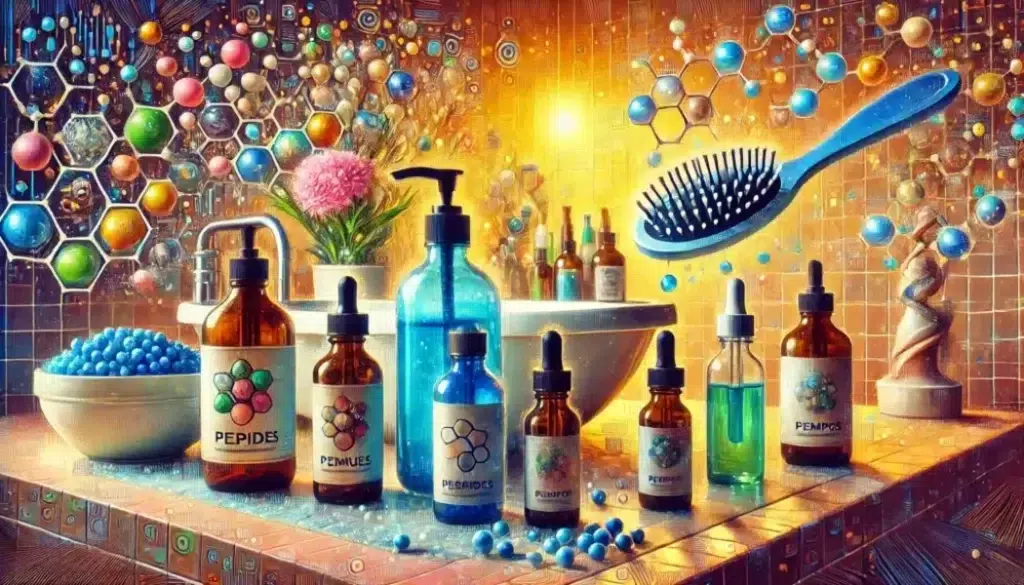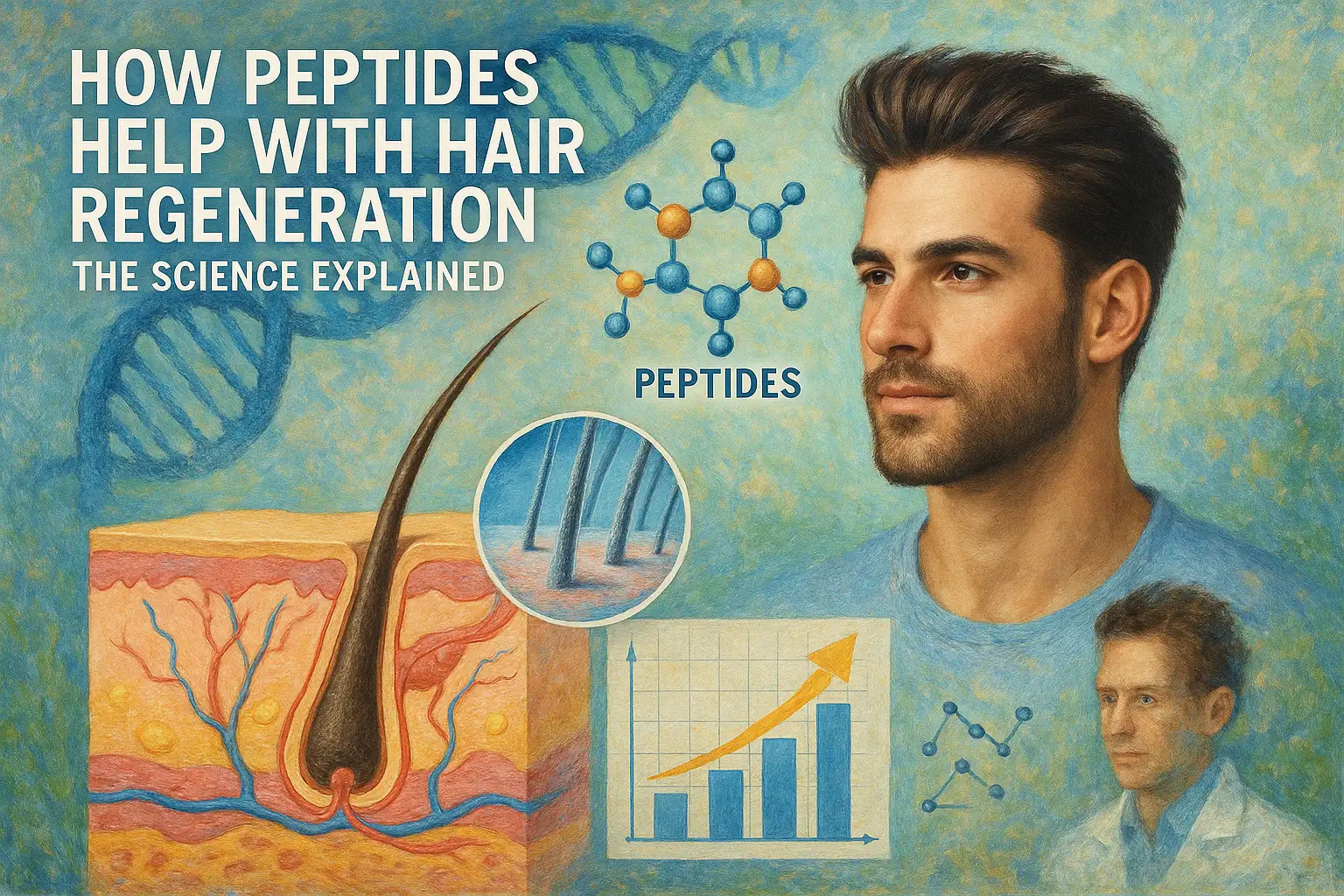Peptides have been making waves in the world of hair care, offering a fresh, scientific approach to hair regrowth. These small chains of amino acids, essentially the body’s building blocks, are gaining traction for their unique role in biological processes.
In the context of hair regeneration, peptides are a hot topic. They’re breaking ground as potential game-changers that might transform how we tackle hair thinning and loss. From biology enthusiasts to beauty aficionados, everyone seems to have peptides on their radar, and with good reason.

Recent years have seen a surge in research dedicated to unlocking their secrets. This growing interest has opened up exciting possibilities, showcasing how peptides might just hold the key to not only halting hair loss but even reversing it.
So, what draws researchers and users alike to peptides? The appeal lies in their multifaceted potential. Peptides aren’t one-trick ponies; they play various roles in the body, including collagen production and skin rejuvenation, which naturally extend to hair health.
As studies continue to unfold, we’re standing on the brink of potential breakthroughs that could redefine traditional hair care approaches. From serums to shampoos, these powerful compounds are steadily making their way into the mainstream, sparking a new era in the fight against hair loss.
🧬 Peptides at the Molecular Level: Unraveling the Science Behind Hair Growth
Peptides aren’t just hocus-pocus in the world of hair regeneration—they’re little powerhouses working at the molecular level to promote hair growth. So, what’s going on inside your scalp when peptides are in action? Well, it’s all pretty intriguing stuff.
First off, peptides play a pivotal role in stimulating hair follicles. By communicating with different cells, they help trigger a growth phase in the hair cycle. This is crucial because it gives those dormant hair follicles a nudge, coaxing them back to life and encouraging the sprouting of new hair.
Moreover, peptides influence the production of collagen, a vital skin protein important for the health of both your hair follicles and the surrounding skin. Enhanced collagen production means a more robust foundation for hair growth, ensuring that new hair is strong and healthy from the get-go.

Good circulation is key, right? Peptides are also known to improve scalp blood flow, ensuring that hair follicles get all the nutrients they need. With the boost in circulation, there’s a higher chance of supporting thicker, more resilient hair.
Let’s not just take these claims at face value, though! Scientific studies back up these effects. Various research papers have illustrated the positive impact peptides have on hair growth, highlighting their role in stimulating follicle activity and promoting a good hair environment.
One such study focused on how certain peptides can activate growth factor pathways in hair follicles, setting the scene for potential new hair growth. These findings are not only promising but also pave the way for more advanced peptide-based treatments in the near future.
⚖️ Why Peptides Stand Out: Comparing with Minoxidil and Finasteride
Minoxidil and finasteride might be household names when it comes to hair growth treatments, but peptides? They’re carving out a niche all their own. So how do these peptides compare to the time-tested options of minoxidil and finasteride?
Let’s start with the basics: Minoxidil primarily works by widening blood vessels, which boosts blood flow to the scalp, encouraging hair growth. Finasteride, on the other hand, tackles hair loss by blocking dihydrotestosterone (DHT), a hormone linked to hair thinning. Peptides? They stimulate hair follicles directly and promote collagen production, which can address hair health at a structural level.

Safety and side effects are a big deal in the hair growth world. Minoxidil can sometimes cause irritation or unwanted hair growth in areas other than the scalp, while finasteride comes with a warning for potential sexual side effects. Peptides are generally considered gentle on the scalp, making them suitable for a broader range of users.
When it comes to results, peptides aren’t necessarily a rapid fix. While finasteride might slow down hair loss relatively fast, peptides often work gradually, nurturing and revitalizing your scalp for sustainable growth over time. This approach might be slower, but it tends to focus on holistic hair health.
Peptides offer a flexibility that the big names might not. Available in serums, shampoos, and hair treatments, they fit seamlessly into various hair care routines. This adaptability means they can easily complement other treatments you’re already using, allowing for a more customized approach to hair care.
🎯 Practical Applications and Expectations: Maximizing Results with Peptides
When it comes to getting the most out of peptides, understanding application methods and managing expectations is key. Peptides come in all sorts of forms, from serums you can massage into your scalp to shampoos and treatments that integrate into your regular hair care routine.
Serums are often a go-to for those serious about hair regrowth. They’re typically loaded with other nourishing ingredients that team up with peptides to offer the scalp a cocktail of goodness. When using serums, the best approach is often applying a few drops directly onto the scalp and massaging it gently, which can enhance absorption and stimulate circulation.

Peptide-infused shampoos are another yummy treat for your hair! They can be a simple addition to your wash-day routine, allowing peptides to do their magic during your regular cleansing rituals. While shampoos might not be as concentrated as serums or treatments, regular use can contribute to healthier hair and scalp over time.
Now, let’s talk about treatments—these are usually more intense, often used once or twice a week. They might come with higher concentrations of peptides and are applied for longer periods before rinsing off. It’s kind of like giving your scalp a nutrient bath!
Of course, patience is important when using these products. It usually takes a few months to start seeing noticeable results, though some folks might notice changes in hair texture and health much sooner. The exact timeline can vary depending on factors like your hair type, how consistently you use the products, and your overall scalp condition.
Ensuring you’re not overcrowding your regimen with too many products at once is crucial. Sticking to a simple, consistent routine is often the best course of action. If you’re introducing new peptide products, keep an eye on how your scalp and hair respond and adjust accordingly.
🧴 Safe and Effective Usage: Peptide Products in Your Daily Routine
Peptide products are all the rage, and incorporating them into your daily hair care routine can be a breeze if you know your stuff. The beauty of peptides lies in their flexibility—whether you’re using a serum, shampoo, or treatment, there’s a way to fit them effortlessly into your regimen.
When exploring peptide products, consider those with a good reputation and user reviews. Some of the current favorites include peptide-rich serums and multi-action formulas designed to nourish the scalp while promoting healthier hair.

To get the most bang for your buck, consistency is your best ally. Regular application, whether on wash days or through nightly treatments, will encourage more robust results. Remember, listening to your scalp is key! If it starts to feel irritated or if you notice any adverse reactions, it might be time to scale back or try a different formula.
A holistic approach to hair care can really enhance your results with peptides. It includes everything from ensuring proper nutrition to managing stress levels. Sometimes, what’s going on inside can impact what you see on the outside. Healthy eating and minimizing stress can go a long way in promoting a thriving scalp and hair.
Combining peptides with other treatments, like DHT-blocking lotions or laser therapy, might amplify results, boosting your haircare routine’s effectiveness. But as always, moderation and balance are crucial. It’s about building a routine that feels right for you and fosters long-term hair health.
Before racing to stock up your cabinets, remember that not everyone sees the same results, and patience is a virtue in the journey of hair care. Celebrate the small wins—a bit more shine, a fuller feel. They all add up.
Stay with us — the best is yet to come.
By following our advice, you’re doing the most you can for your hair.
Be the first to know when we publish new guides, tests, and proven strategies for stronger, healthier hair.
👉 Visit the About Me page to learn more about my journey, mission, and why helping people with hair health is so personal to me.
Want healthier, stronger hair? Discover 8 science-backed habits that protect your scalp and boost natural growth. Get your free PDF guide today!
Disclaimer: This article is for informational purposes only and is not a substitute for professional medical advice. Sensitive claims are supported with scientific references, and full product details can always be found on the official websites of the respective manufacturers or distributors.
Some links in this article are affiliate links. If you choose to make a purchase through them, I may earn a small commission at no extra cost to you — helping me keep HairGrowGenius running. Thank you for your support!

✅ FAQ – The Science Behind Peptides: How They Help With Hair Regeneration
❓ What’s the difference between copper peptides and growth factor peptides in hair care?
Copper peptides focus on healing and increasing blood flow, while growth factor peptides (like GHK-Cu or biomimetic peptides) mimic natural signals that trigger the hair growth cycle. They act through different pathways but are often complementary in advanced treatments.
❓ Are peptide-based hair treatments safe for long-term use?
Yes—most are considered safe when used as directed. Since peptides are short chains of amino acids already found in the body, they typically have low toxicity and good tolerance. However, overuse or combining with harsh actives might cause irritation in sensitive individuals.
❓ Can peptides reverse genetic hair loss (androgenetic alopecia)?
Peptides can’t “reverse” genetic predisposition, but they can delay progression and improve follicle health. By improving scalp environment and extending the growth phase, they may support density and strength—even in cases of hereditary thinning.
❓ Do topical peptides actually penetrate deep enough to reach hair follicles?
Some do, especially when formulated with delivery enhancers like liposomes or nanocarriers. Not all peptides can penetrate the skin barrier effectively, which is why formulation quality and molecular size matter a lot in topical applications.
Last updated: June 2025 based on latest research


Leave a Reply